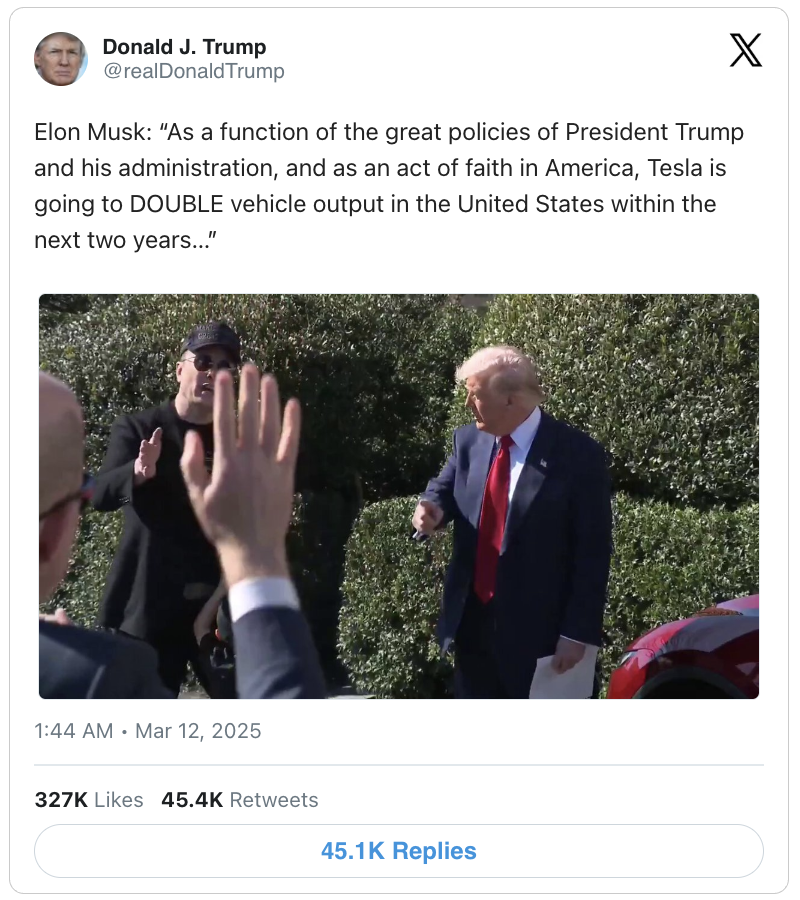Symbolism vs. Strategy: EV Rollbacks, Greenland Disputes, and Education Reform
What has President Trump said this week?
〰️
What has President Trump said this week? 〰️
1.Future of U.S. Department of Education in Question
Last Thursday, President Trump signed an executive order aimed at dismantling the U.S. Department of Education, claiming it has long pushed “woke” policies without delivering meaningful improvements in student outcomes. He argued that education should be governed by state and local authorities, which already manage curriculum, staffing, budgeting, and scholarship programs (AP, 2025).
The Department of Education, however, currently plays a vital role in shaping national education policy, enforcing anti-discrimination laws, and administering funding for students from low-income backgrounds and those with disabilities. Federal contributions make up approximately 14% of public school funding (AP, 2025).
The potential consequences of this move are primarily financial and legal. The future of federal student loans and financial aid remains uncertain, while the rollback of federal oversight raises concerns about uneven civil rights enforcement. Critics also warn that progressive-leaning institutions may face challenges in maintaining college accreditation (AP, 2025).
While the executive order marks a symbolic step, President Trump cannot unilaterally dismantle the Department. Such a move would require congressional approval, leaving the ultimate outcome uncertain (Brookings, 2025).
2. Greenland Tensions
President Trump has reiterated his intent for the United States to acquire Greenland, a self-governing territory within the Kingdom of Denmark, stating it will happen “one way or another.” Amid growing Russian and Chinese activity in the Arctic, the administration has framed U.S. interest in the island as a matter of national and global security.
While the idea of acquiring Greenland dates back to 1867, it has gained renewed attention under Trump. Danish Prime Minister Mette Frederiksen has strongly pushed back, declaring that Greenland “is not for sale” and, most recently, accusing the U.S. of applying “unacceptable pressure” on the territory (CNN, 2025).
Adding to the tension, the U.S. Second Lady, Usha Vance, is scheduled to visit Greenland alongside National Security Adviser Mike Waltz. Greenland’s Prime Minister denounced the visit as “extremely aggressive.” In a surprise move, Vice President JD Vance announced he would accompany his wife, joking that he “didn’t want her to have all this fun by herself.”
Despite the Vice President’s lighthearted comment, the visit’s itinerary was abruptly revised—scrapping cultural events and limiting the delegation’s activities to the Pituffik Space Base, a key U.S. military installation on Greenland’s western coast. The base, operational since 1951 under NATO’s defense framework, plays a central role in the U.S. Arctic strategy.
Critics warn that the administration’s increasingly unilateral posture is straining relationships with key allies and undermining long-standing cooperation in the region.
3. The EV Contradiction
On his first day back in office, President Trump signed an executive order reversing several Biden-era policies aimed at promoting electric vehicles (EVs), reaffirming his administration’s support for fossil fuels. The order reflects a broader commitment to increasing domestic oil and gas production and lowering energy costs for American consumers (The Guardian, 2025). Among the rescinded policies was President Biden’s target for EVs to comprise 50% of new car sales by 2030.
Yet in a seemingly contradictory move, Trump recently hosted a public event to receive a gifted Tesla—widely regarded as a symbol of the EV industry—and praised both the company and its CEO, Elon Musk, who now serves in an advisory role within the administration. Following the event, Musk announced on social media: “Tesla is going to DOUBLE vehicle output in the United States within the next two years.


